Microsoft retired several conferences this year (TechEd, MEC, MMC, etc) and merged them into a single mega-conference called Microsoft Ignite 2015. About 23,000 people (~29k including all staff and support personnel) converged on the McCormick Place Conference Center in Chicago, IL during the week of May 4th (May the Fourth be With You!). I recently …
Tag: mimikatz
Feb 18 2015
Interesting KRBTGT Password Reset Behavior
Following up on Twitter conversations (@passingthehash, @scriptjunkie1, gentilkiwi, etc) on the new KRBTGT Password Reset Script and Skip Duckwall’s (@passingthehash) blog post on how KRBTGT password changes work. Microsoft KB2549833 states that the KRBTGT password is set automatically to a random string when a new password is entered. This occurs because there is special logic …
Dec 15 2014
Detecting MS14-068 Kerberos Exploit Packets on the Wire aka How the PyKEK Exploit Works
MS14-068 References: AD Kerberos Privilege Elevation Vulnerability: The Issue Detailed Explanation of MS14-068 MS14-068 Exploit POC with the Python Kerberos Exploitation Kit (aka PyKEK) Exploiting MS14-068 Vulnerable Domain Controllers Successfully with the Python Kerberos Exploitation Kit (PyKEK) This post shows the packet captures I performed using WireShark on the Domain Controllers during stage 1 and …
Dec 07 2014
Exploiting MS14-068 Vulnerable Domain Controllers Successfully with the Python Kerberos Exploitation Kit (PyKEK)
MS14-068 References: AD Kerberos Privilege Elevation Vulnerability: The Issue Detailed Explanation of MS14-068 MS14-068 Exploit POC with the Python Kerberos Exploitation Kit (aka PyKEK) Detecting PyKEK Kerberos Packets on the Wire aka How the MS14-068 Exploit Works After re-working my lab a bit, I set about testing the MS14-068 POC that Sylvain Monné posted to …
Nov 22 2014
Mimikatz and Active Directory Kerberos Attacks
NOTE: While this page will remain, the majority of the Mimikatz information in this page is now in the “Unofficial Mimikatz Guide & Command Reference” which will be updated on a regular basis. Mimikatz is the latest, and one of the best, tool to gather credential data from Windows systems. In fact I consider Mimikatz …
Nov 18 2014
MS14-068: Vulnerability in (Active Directory) Kerberos Could Allow Elevation of Privilege
Active Directory leverages the Kerberos protocol for authentication. The vulnerability patches an issue with how the Domain Controller validates group membership in Kerberos tickets (hint: the ticket is always validated by the DC if the checksum is set to certain values). Microsoft KB3011780 patches this issue. According to Microsoft: “When this security bulletin was issued, …
Nov 06 2014
How Attackers Extract Credentials (Hashes) From LSASS
I performed extensive research on how attackers dump credentials from LSASS and Active Directory, including pulling the Active Directory database (ntds.dit) remotely. This information is covered in two newer and greatly expanded posts: How Attackers Dump Active Directory Database Credentials Attack Methods for Gaining Domain Admin Rights in Active Directory Attackers can pull credentials …
Oct 30 2014
BlueHat 2014 Slides: Reality Bites – The Attacker’s View of Windows Authentication and Post-exploitation
Each year, Microsoft invites security researchers (aka hackers) to speak to Microsoft employees about security issues. One of the most interesting talks listed at “BlueHat” 2014 was the one by the “Pass-the-Hash” experts, Chris Campbell, Bejamin Delpy, and Skip Duckwall. This talk will focus on the how Windows authentication works in the real world and …
Sep 06 2014
The Evolution of Protected Processes Part 1: Pass-the-Hash Mitigations in Windows 8.1
Pass-the-Hash has been around for years The post on Alex Ionescu’s blog, The Evolution of Protected Processes Part 1: Pass-the-Hash Mitigations in Windows 8.1, describes the latest mitigation techniques Microsoft is incorporating in the latest versions of Windows. He describes the importance of LSASS in his post: (emphasis/bold text is my own) The LSASS Process In …

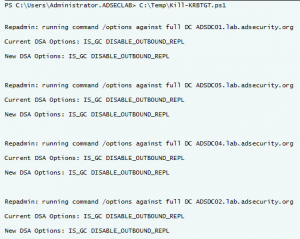
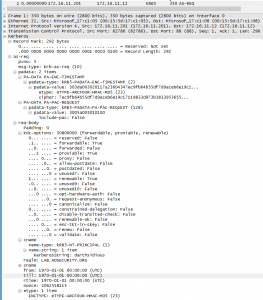
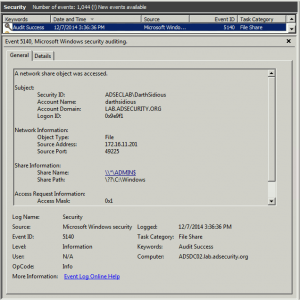
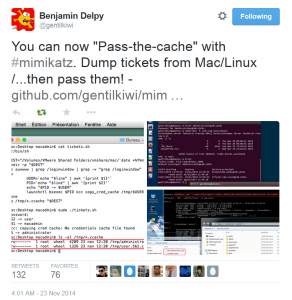
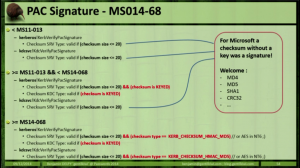
Recent Comments